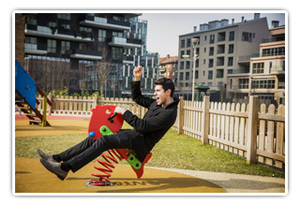 Remember sitting in the classroom, watching the clock and praying for the bell to ring? It was time for recess! After the break, you'd come back ready to face the rest of the school day.
Remember sitting in the classroom, watching the clock and praying for the bell to ring? It was time for recess! After the break, you'd come back ready to face the rest of the school day.
Play is a natural and accepted part of childhood. It's relaxing, it's pleasurable and it serves as a way to learn a number of foundational skills we need for success in the adult world.
When we become adults, play somehow gets left behind and replaced with deadlines, responsibilities and the demands of a career. Living in our grown-up world, all too often the message is that adults don't play and that we really ought to leave that part of us behind. But is this wise?
Findings suggest that play can be beneficial for grown-ups too!
Play Encourages Creativity
Research has found that taking a break and having a little fun helps to relieve tension and improve problem-solving abilities. Play activates the pleasure centers of the brain and stimulates areas of the brain responsible for mental flexibility and creativity. [1]
Playing, especially play that engages our imagination can increase our creativity, which in turn enhances our problem-solving ability, helping us to find solutions to problems that we might otherwise have overlooked.
Simply put, play flexes the creative muscle of the mind!
Play Encourages Good Health
Play and laughter go hand-in-hand. Playing and laughing bring us into the moment, providing both an easing of physical tension and a release of emotion. Together, they deliver a double dose of health benefits.
Research has found that engaging in pleasurable or humorous activities relieves stress, stimulates the immune system, encourages the release of 'feel good' endorphins and may improve inflammation and the function of blood vessels.
The take-home message here is clear: find something fun and do it. Your body and your mind will thank you for it.
Play Encourages Happiness
One of the most interesting things about play is that it can spontaneously move us into the moment, allowing us to get totally lost in the experience. When this happens, we are in what has been called 'the flow', a state of intense joy.
Research suggests that play is a fundamental need for humans, something present throughout the lifespan. Play contributes to our sense of well-being, connectedness and ability to cope with life's challenges.
An absence of play isn't work but depression. Another great reason to get out and play!
Play Encourages Mental Acuity
A number of studies suggest that physical activity, puzzles and games may delay cognitive decline and help to maintain optimal brain function.
Physical activity and tasks that require mental manipulation require us to access areas of the brain involved in information processing and problem-solving. Engaging the brain in this way activates brain cells and improves their efficiency and capacity. Over time, this activity can help to maintain memory and thinking skills.
These days there are any number of puzzle books, apps and online resources for adults. If you prefer to play with others, find like-minded friends and play some old favorites! The key here seems to be to play in a way that keeps us physically and mentally active.
Play Encourages Relaxation
One of the simplest forms of childhood play is coloring and coloring has recently become a very grown-up thing to do. There are now coloring books just for adults! A number of studies have found that coloring can significantly reduce anxiety in adults. [2]
Even better, what you color - Mandalas, abstract designs or a child's coloring book - seems to not matter as much as the act of coloring itself.
When we play, we relax, which in turn promotes feelings of well-being. Whether it's a board game, a puzzle or drawing, the act of doing something fun allows us to lose ourselves in the moment and relax.
The Take Away On Play
As we have seen, research, supports the idea that play is appropriate and necessary throughout our lives. Each stage of life presents its own challenges and play seems to provide a positive way to counter and alleviate the stresses that this can produce.
Nurture the child that is still inside and let him or her out to play. Reconnect with yourself and with others by doing those things that are fun and engaging. The more we do things we enjoy, the more we want to do them and the happier we are.
Perhaps George Bernard Shaw was right when he said, "We don't stop playing because we grow old; we grow old because we stop playing."
References:
1. Zabelina, D., & Robinson, M. (2010). Child's play: Facilitating the originality of creative output by a priming manipulation. Psychology of Aesthetics, Creativity, and the Arts, 4(1), 57-65.
2. Small, S. (2006). Anxiety Reduction: Expanding Previous Research on Mandala Coloring. Undergraduate Journal of Psychology, 19, 15-21.
Peter Field is a UK registered psychotherapist and board certified hypnotherapist. His hypnotherapy Birmingham and London clinics provide hypno-psychotherapy services for a wide range of issues. His extensive range self-hypnosis downloads are also available.